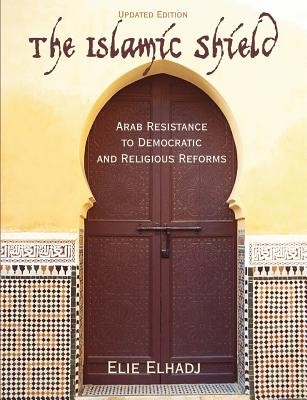
- We will send in 10–14 business days.
- Author: Elie Elhadj
- Publisher: Brown Walker Press (FL)
- ISBN-10: 1599424118
- ISBN-13: 9781599424118
- Format: 18.9 x 24.6 x 1.5 cm, minkšti viršeliai
- Language: English
- SAVE -10% with code: EXTRA
Reviews
Description
America's War on Terrorism uses democratization of the Arab World as a main weapon. The Islamic Shield argues that democratization of Arab countries is a fantasy because democratic elections today would lead to replacing the dictatorships of Arab rulers by Islamist theocratic dictatorships. The book contends that the Arab peoples are generally characterized by a culture of obedience to hierarchical authority in the home, school, mosque, the work place, and the country at large. The book identifies religious and cultural causes, as well as domestic and foreign political factors that set off Jihadists' terrorism. The book recommends solutions, stressing that political expediencies will not end terrorism. The Islamic Shield examines why two different countries; Saudi Arabia, an Islamist monarchy; and Syria, a quasi-secular republic, share in common non-representative non-participatory dictatorships mired in cronyism and corruption. The examination concludes that genuine reforms are not likely soon. The two countries can be prototypes of other Arab countries. The Islamic Shield considers: why do non-Arab Islamic countries elect women as prime ministers while Arab rulers and Ulama (Muslim clergy) condemn democracy as un-Islamic and treat women as lesser beings? Should benevolent dictatorship replace Arab democracy as an objective? Who shapes the Islamic persona? Is Islamic Law changeable? If yes, who may change it? How likely that an Arab Martin Luther, or Kemal Ataturk might emerge? What might be causing the growing attachment of Arabs today to radical Islam? Did politicizing Genesis 15:18 politicize the Quran? How sustainable is a two-state solution to the Palestinian-Israeli conflict? What might the effect of a Shii crescent of influence be on stirring bloody conflicts between Shiis and Sunnis? What might the legacy of the George W. Bush Administration be in the Muslim world? What might be the outcome of the War on Terrorism?
EXTRA 10 % discount with code: EXTRA
The promotion ends in 22d.05:11:33
The discount code is valid when purchasing from 10 €. Discounts do not stack.
- Author: Elie Elhadj
- Publisher: Brown Walker Press (FL)
- ISBN-10: 1599424118
- ISBN-13: 9781599424118
- Format: 18.9 x 24.6 x 1.5 cm, minkšti viršeliai
- Language: English English
America's War on Terrorism uses democratization of the Arab World as a main weapon. The Islamic Shield argues that democratization of Arab countries is a fantasy because democratic elections today would lead to replacing the dictatorships of Arab rulers by Islamist theocratic dictatorships. The book contends that the Arab peoples are generally characterized by a culture of obedience to hierarchical authority in the home, school, mosque, the work place, and the country at large. The book identifies religious and cultural causes, as well as domestic and foreign political factors that set off Jihadists' terrorism. The book recommends solutions, stressing that political expediencies will not end terrorism. The Islamic Shield examines why two different countries; Saudi Arabia, an Islamist monarchy; and Syria, a quasi-secular republic, share in common non-representative non-participatory dictatorships mired in cronyism and corruption. The examination concludes that genuine reforms are not likely soon. The two countries can be prototypes of other Arab countries. The Islamic Shield considers: why do non-Arab Islamic countries elect women as prime ministers while Arab rulers and Ulama (Muslim clergy) condemn democracy as un-Islamic and treat women as lesser beings? Should benevolent dictatorship replace Arab democracy as an objective? Who shapes the Islamic persona? Is Islamic Law changeable? If yes, who may change it? How likely that an Arab Martin Luther, or Kemal Ataturk might emerge? What might be causing the growing attachment of Arabs today to radical Islam? Did politicizing Genesis 15:18 politicize the Quran? How sustainable is a two-state solution to the Palestinian-Israeli conflict? What might the effect of a Shii crescent of influence be on stirring bloody conflicts between Shiis and Sunnis? What might the legacy of the George W. Bush Administration be in the Muslim world? What might be the outcome of the War on Terrorism?


Reviews